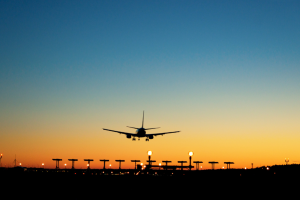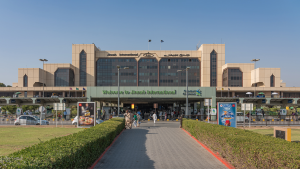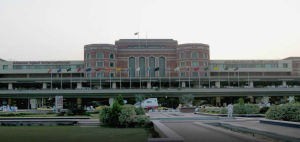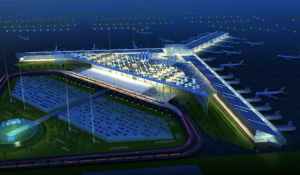
Pakistan, strategically located at the crossroads of South Asia, is served by several international airports that facilitate global connectivity. Major airports like Jinnah International Airport in Karachi, Allama Iqbal International Airport in Lahore, and Islamabad International Airport are crucial for passenger and cargo traffic, playing a significant role in the country’s tourism, business, and cultural exchange.
In addition to these major hubs, medium and smaller airports, such as those in Multan, Quetta, Sialkot, and Peshawar, further enhance travel options across the country. With the upcoming Gwadar Airport expected to be operational by December 2024, Pakistan’s aviation infrastructure is set to expand, bolstering its role in regional and global connectivity.
Overview of International Airports in Pakistan
Pakistan hosts several international airports that serve as crucial gateways for air travel, facilitating both passenger and cargo transport. The major airports located in key cities provide connectivity to destinations around the world.
1. Jinnah International Airport (Karachi)

Jinnah International Airport, located in Karachi, is the largest and busiest airport in Pakistan. It features three major terminals: the International Terminal, the Domestic Terminal, and the Hajj Terminal, accommodating millions of passengers annually.
The airport operates numerous international flights, connecting Karachi to destinations in the Middle East, Asia, Europe, and North America. Airlines such as Pakistan International Airlines (PIA), Emirates, and Qatar Airways utilize this airport. Facilities include duty-free shops, lounges, and restaurants for passenger convenience.
2. Allama Iqbal International Airport (Lahore)

Allama Iqbal International Airport serves Lahore, the cultural capital of Pakistan. This airport is divided into three terminals: the Allama Iqbal Terminal for international flights, the Domestic Terminal, and the Hajj Terminal.
The airport caters to various international carriers, facilitating travel to destinations such as Dubai, London, and Doha. It has undergone expansions and improvements to enhance passenger services, including modern amenities and enhanced security protocols. Passengers can enjoy retail shops, restaurants, and comfortable waiting areas while at the airport.
3. Islamabad International Airport

Islamabad International Airport, located near the nation’s capital, is designed to meet modern standards for international air travel. The airport has a single terminal that serves both international and domestic flights, accommodating a growing number of passengers.
With direct flights offered to numerous global cities, this airport plays a vital role in promoting tourism and business in Pakistan. Facilities include lounges, dining options, and shopping areas to provide a pleasant travel experience. The airport’s strategic location allows for easy access to Islamabad and surrounding regions.
Operational Aspects of Pakistani International Airports
Pakistani international airports play a crucial role in facilitating air travel and cargo transport. Their operational aspects encompass various elements, including runway and terminal facilities, air traffic control, passenger services, and cargo operations.
Runway and Terminal Facilities
Pakistan has several international airports, each equipped with runways and terminal facilities that meet global standards. Major airports like Islamabad International Airport, Karachi International Airport, and Lahore Allama Iqbal International Airport have multiple runways designed to accommodate large aircraft.
Terminals are modern, and spacious, providing essential functions for both international and domestic travel. Features such as duty-free shops, lounges, and food courts enhance passenger experience. The airports ensure compliance with international safety protocols, which is crucial for efficient operations and passenger comfort.
Air Traffic Control and Safety Measures
Air traffic control (ATC) in Pakistan is managed by the Pakistan Civil Aviation Authority (PCAA). This agency oversees airspace management, ensuring safe takeoffs, landings, and in-flight navigation. Advanced radar technology and communication systems are employed to maintain efficient air traffic flow.
Safety measures are strict, involving regular maintenance checks and operational readiness reviews. Airports implement standard operating procedures for emergencies, including medical emergencies and inclement weather, ensuring passengers’ safety during all phases of travel.
Passenger Services and Amenities
Passenger services in Pakistani international airports are designed to enhance travel ease and comfort. Facilities include check-in counters, baggage claim areas, and security checkpoints, all equipped with updated technology to streamline processes.
Amenities like lounges offer relaxation spaces, while free Wi-Fi access and business centers cater to business travellers. Payment options are diverse, with local and international currencies accepted, facilitating smoother transactions for passengers.
Cargo and Freight Operations
Cargo operations at international airports in Pakistan are vital for trade and commerce. Each major airport has dedicated cargo terminals equipped to handle various types of goods, ranging from perishables to industrial products.
Handling facilities are designed to ensure efficient loading, unloading, and storage of freight. Customs regulations are strictly followed, and airports utilize advanced tracking systems to provide real-time updates to shippers. These operational aspects contribute significantly to the efficiency of Pakistan’s logistics network, fostering economic growth.
Conclusion
Pakistan’s international airports are vital hubs for travel and trade, enhancing regional accessibility and supporting tourism and business sectors. Key airports in Karachi, Lahore, and Islamabad, along with others in cities like Peshawar and Sialkot, are equipped with modern infrastructure. With growing passenger numbers and ongoing development, Pakistan is set to play a larger role in global air travel.

